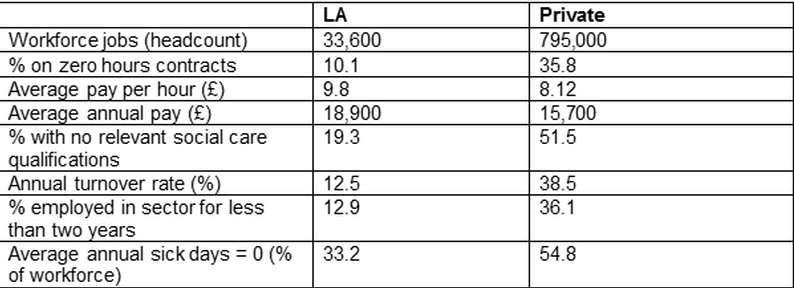Union warns private sector care workers three times more likely to be on zero hours
Those working for private care companies earn 17 per cent lower than those in the public sector, with four in ten in the private sector leaving their job every year, according to the union GMB.

GMB union analysed figures from Skills for Care and found over half of care workers for private providers have no relevant social care qualifications, compared with less than 20 per cent in the public sector.
The union attributes this to a lack of funding, highlighting a report by MPs last year on the long-term funding of adult social care, which found local authorities are providing ‘only small yearly fee uplifts' to private providers and that fee levels 'are still below the benchmark costs of care.
'Recruiting and retaining quality staff to tight budgets is one of the most challenging issues providers are facing'
Rehana Azam, GMB national secretary, said: “These sobering statistics show a lack of funding in the care sector is putting the profession in serious danger. This Government is bungling Brexit and can’t even get it together to publish its long-awaited Green Paper on social care.
“We need action - GMB is now calling for special status for our EU care workers so we can continue to care for vulnerable people regardless of what happens with Brexit.
“Recruiting and retaining quality staff to tight budgets is one of the most challenging issues providers are facing.”
In a Radio 4 interview, Labour spokesperson Barbara Keeley said: “We are committing 350 million pounds a year to train care staff as people’s needs are more complex and there isn’t a career path.
“One in four care staff are leaving every year which is not good for continuity and not good for care quality.”
Karolina Gerlich, chief executive of NACAS (National Association of Care and Support Workers) added: “The care sector has been underfunded for too long now which is affecting quality of care delivered.
"Commissioning care by the hour, huge issues with sleep-in pay, pay for live-in care workers and travel time often unpaid, on top of such a large number of zero-hours contracts push care workers into financial trouble and poverty. Zero-hours contract may work for some but in many cases are used one way to the disadvantage of care workers.
"People leave the sector often because of the above issues. All of that affects quality of care.
"We cannot expect care workers to deliver care with respect and dignity if they are not treated that way themselves."
Comparison of LA-employed and privately-employed care workers Data from the Skills for Care National Minimum Dataset

carehome.co.uk lists a wide range of jobs within the care home environment. To look for jobs click here
Latest News
 29-Jul-24
Dementia Bus gives carehome.co.uk staff insight into life with dementia
29-Jul-24
Dementia Bus gives carehome.co.uk staff insight into life with dementia
 01-Mar-24
Find out the top care homes in 2024
01-Mar-24
Find out the top care homes in 2024
 21-Mar-23
UK's top care homes in 2023 revealed
21-Mar-23
UK's top care homes in 2023 revealed
 03-Jan-23
carehome.co.uk launches free care helpline
03-Jan-23
carehome.co.uk launches free care helpline
 13-Dec-22
5 mins with Emily Whitehurst, chief operating officer for Constantia Healthcare
13-Dec-22
5 mins with Emily Whitehurst, chief operating officer for Constantia Healthcare